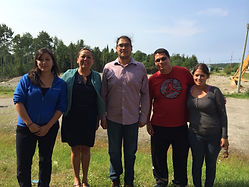The Institute for Culturally Restorative Practices

Resources
Culturally Restorative Practices
The Institute for Culturally Restorative Practices, Inc. understands change happens at an individual level, and within their scope of influence they make the changes within organizations more effectively than an outsider coming in. In our experience, the Culturally Restorative Practices educational seminars gives practitioners the ability to make meaningful and sustained changed for the Indigenous child, family, and community we serve.
Resources
Culturally Restorative Developmental Milestones
Culturally restorative practices are an important part of child development trajectories but are not typically included in assessment and practice with Indigenous clientele. In depth discussion to Indigenous child development for children and youth transitioning to adulthood along with contextual implications on current issues, best practices for successful engagement with Indigenous populations, Western developmental theories and a comparisons and contrast with Indigenous perspectives on development, in addition to implications for child and youth services is presented.
Developmental psychology is a phenomenon that has etched the development of Indigenous children for centuries. All developmental theory is relevant; however, developmental theorist omitted the spirit when working with the Indigenous population. As a result, applying non-Indigenous developmental theories with Indigenous youth exclusively will not provide a comprehensive or accurate profile, nor will it produce positive outcomes, as it is quantified against mainstream norms without the socio-economic contextual factors which influence development. The educational seminar will begin to deconstruct development from an Indigenous perspective. Indigenous development must been seen in the light of the context of historical effect and its consequences on present day issues. Furthermore, these present day issues must be reconciled with cultural safety efforts.
Resources
Indigenous Well-being Theory
Deconstructing mainstream models of well-being is an important part of Indigenous well-being development. The drivers of success are different than mainstream Canadian models, because we as Indigenous people want our children, youth, families, communities, and Nations to be 'happy, healthy, whole" in an environment that is safe. To do this, we need to create the landing spot for our future.
The Institute's model of Indigenous Well-being begins with understanding context, centres on the spirit, and focuses on social, emotional, cognitive, and physical elements of well-being.
Resources
Cultural Attachment Theory
Making your connection to your cultural teachings is cultural attachment. Cultural attachment is a philosophy, which encapsulates how an individual bonds to his or her culture. Cultural attachment creates a direct spiritual force, where the bond begins, develops, and evolves for the individual. Cultural attachment theory as a champion to culturally restorative practice. Cultural attachment theory seeks to secure knowledge of family, extended family, community, and Nation and their relationship to each other and the world. Cultural attachment theory is the natural resiliencies, which exist within the Aboriginal cultural structures, which are supported by the roles inherent in raising a child of the Creator. Cultural attachment theory provides an Aboriginal child with the ability to have a secure base in which he or she can explore the world. More specifically, cultural attachment theory provides the individual with cultural support, via the structures to successful transition to adulthood. Cultural attachment theory promotes the affectionate bond between a child and his family that endures over time and space throughout one’s lifetime. Further, cultural attachment theory in application is the systematic embracing of the Aboriginal culture and matching of services to meet the cultural needs of the Indigenous child.
Resources






